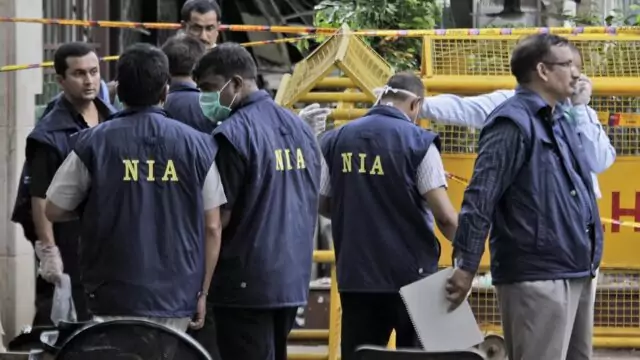Animesh Roul

Executive Summary
- India’s National Investigation Agency (NIA) arrested over 180 people in 2023 for involvement in jihadist terror cases, 65 of which were associated specifically with IS, as part of a broader strategy to disrupt IS’s influence in India.
- In December 2023 alone, the NIA conducted widespread raids across the country, arresting dozens of individuals linked to Islamic State (IS) networks and seizing weapons, explosives, and propaganda materials.
In December 2023, the National Investigation Agency (NIA), India’s elite anti-terror organization, arrested several individuals during extensive search and sweep operations across India, which targeted nearly 60 hotspots. The operations sought to thwart clandestine Islamic State (IS) networks, charging the individuals arrested with promoting and executing IS-inspired plots (Mint [India], December 28, 2023). Security officials confiscated cash, weapons (such as improvised explosive devices or IEDs), and propaganda materials on digital devices. This series of crackdowns was part of the NIA’s broader strategy to disrupt transnational jihadist groups’ footprint and influence across India.
Targeting Islamic State’s Indian Affiliates
On December 9, 2023, the NIA raided nearly 40 locations and arrested members of IS cells in Maharashtra, which were operating from the Padgha-Borivali area of the city of Thane. This group was reportedly headed by Saqib Nachan, who pledged allegiance to IS. Under Nachan’s command, the group declared Padgha a “liberated zone” and named it “al-Sham,” which is a reference to the Levant. Nachan and his group were recruiting vulnerable Muslim youth to wage war against India (The Print [India], December 9, 2023). Nachan, an explosive expert and former leader of the banned Student Islamic Movement of India (SIMI), was already a convicted terrorist and reportedly offered his allegiance to IS under the guidance of foreign handlers (India Today, May 27, 2016; Times of India, November 22, 2017). The NIA believes that Nachan holds the key to the identities of overseas IS handlers who were in communication with both Nachan and Mohammad Imran Khan. Khan was the leader of the Pune-based IS network, or what was known as “IS in al-Sufa” (Hindustan Times, August 12, 2023; Daily Pioneer, December 10, 2023).
Shortly after those raids, on December 18, the NIA again carried out raids across four states and 19 locations, apprehending eight members of another IS-inspired cell called “IS in Ballari,” including the group’s leader, Muhammed Sulaiman (alias Minaz). Ballari refers to the Karnataka area from which the leader and most of his cell members were based. The raids, which covered Ballari and Bengaluru in Karnataka, Amaravati, Mumbai, and Pune in Maharashtra, Jamshedpur and Bokaro in Jharkhand, and the national capital Delhi, were aimed at thwarting the cell’s plans to carry out multiple bombings. The operatives were found with a stash of explosive materials, weapons, and other incriminating evidence, such as chemicals and substances used for making IEDs, sharp-edged weapons, cash, and digital devices. The operatives, led by Minaz, were actively involved in promoting jihad. They used encrypted apps for communication and targeted college students for recruitment. The NIA’s investigations revealed a comprehensive plan to use the explosives as part of a larger plot (Times of India, December 19, 2023).
In 2021–2022, the NIA conducted countrywide raids similar to the ones in December 2023. In this sweep, it detained IS supporters, including several Islamic State in Khorasan Province (ISKP) militants. The agency achieved a breakthrough in exposing IS’s “Voice of Hind” network in Kashmir and beyond, which was coordinated by Umar Nisar, Tanveer Bhat, and Rameez Lone. The raids disrupted major IS propaganda activities in the region (NIA, July 12, 2021; ABP Live, March 12, 2022). Voice of Hind magazine has since become defunct but previously produced and disseminated IS-related propaganda material aimed at recruiting Muslim youths in India.
Conclusion
Since the NIA was constituted in 2008, it has achieved a conviction rate of 94.7 percent in terror cases. In 2023 alone, NIA registered a total of 68 cases, which covered a broad spectrum of cases, including jihadist terror as well as organized crime and counterfeiting. According to a press release, in the last year, the NIA has arrested a total of 180 individuals in jihadist terror cases, 65 of which were believed to be associated with IS (Daily Guardian [India], January 1).
To achieve these numbers, the NIA has been working with state and central government agencies, conducting widespread raids, and arresting operatives of various terror networks in Muslim-dominated areas of India. Over the past few years, these agencies have exposed multiple pro-IS groups and cells. As the NIA is still investigating and arresting members of IS-inspired networks across India, the country’s premier anti-terror agency remains apprehensive about still-existing IS sleeper cells and sympathizers in India, which will continue to pose a threat to the country’s security.
No comments:
Post a Comment